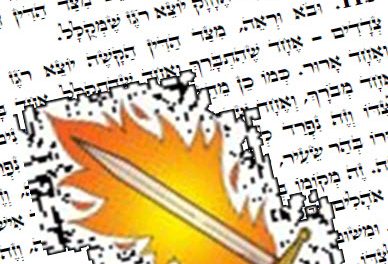Daily Zohar # 4827 – Vayikra – Remember your Creator in the days of your youth
Daily Zohar 4827

Hebrew translation:
213. וְעַל זֶה עַד שֶׁיָּפוּחַ הַיּוֹם, שֶׁצָּרִיךְ אָדָם לְתַקֵּן מַעֲשָׂיו. שֶׁכְּשֶׁמַּגִּיעִים יָמָיו לְהִסְתַּלֵּק מֵהָעוֹלָם, הַקָּדוֹשׁ בָּרוּךְ הוּא תּוֹהֶה עָלָיו וְאוֹמֵר, וְנֶפֶשׁ כִּי תֶחֱטָא וְשָׁמְעָה קוֹל אָלָה, וַהֲרֵי הִשְׁבַּעְתִּי אוֹתָהּ בִּשְׁבוּעָה שֶׁל שְׁמִי שֶׁלֹּא לְשַׁקֵּר בִּי, וְהֵעַדְתִּי בָהּ כְּשֶׁיָּרְדָה לָעוֹלָם, וְהוּא עֵד וַדַּאי, מִכַּמָּה פְעָמִים שֶׁהֵעַדְתִּי בָהּ לִשְׁמֹר מִצְווֹתַי. לָכֵן, הוֹאִיל וְהָאָדָם הוּא עֵד, בְּשָׁעָה שֶׁיָּשׁוּב לִפְנֵי הַמֶּלֶךְ – אוֹ רָאָה אוֹ יָדָע. אוֹ רָאָה אוֹתָם חֲטָאִים שֶׁעָשָׂה וְהִתְבּוֹנֵן בָּהֶם. אוֹ יָדָע בְּבֵרוּר הַדָּבָר שֶׁעָבַר עַל מִצְוַת רִבּוֹנוֹ. אִם לוֹא יַגִּיד – אִם לֹא יוֹדֶה עֲלֵיהֶם לִפְנֵי רִבּוֹנוֹ (מַה כָּתוּב) כְּשֶׁיֵּצֵא מִן הָעוֹלָם הַזֶּה, וְנָשָׂא עֲוֹנוֹ. וּכְשֶׁיִּשָּׂא עֲוֹנוֹ, אֵיךְ יִפְתְּחוּ לוֹ פֶּתַח וְאֵיךְ יַעֲמֹד לִפְנֵי רִבּוֹנוֹ, וְעַל זֶה נֶפֶשׁ כִּי תֶחֱטָא כָּתוּב.
.
Zohar Vayikra
Continued from previous DZ
#212
And this is the meaning of the verse: “עַד שֶׁיָּפוּחַ הַיּוֹם וְנָסוּ הַצְּלָלִים” “Until the day breathes and the shadows flee away” (Song of Songs 2:17). For once these shadows (tzelem) depart from him, and he is bound in chains, meaning: when he is approaching death—If he does teshuvah (repentance) then, It is still considered teshuvah, but it is not as good as the teshuvah done while he is still in his full strength and being. And so King Solomon proclaimed and said: “וּזְכֹר אֶת בּוֹרְאֶיךָ בִּימֵי בְּחוּרֹתֶיךָ עַד אֲשֶׁר לֹא יָבֹאוּ יְמֵי הָרָעָה” “And remember your Creator in the days of your youth, before the days of evil come…” (Ecclesiastes 12:1)
#213
And therefore: “עַד שֶׁיָּפוּחַ הַיּוֹם” “Until the day breathes”—a person must rectify his deeds, for when his days arrive to leave this world, the Holy One, Blessed be He, marvels at him and says: “וְנֶפֶשׁ כִּי תֶחֱטָא וְשָׁמְעָה קוֹל אָלָה” “And if a soul shall sin and hears the voice of an oath…” (Leviticus 5:1) I caused her to swear in My Name, that she would not lie against Me, and I testified upon her when she descended into the world. And he (the soul) is a witness, for many times I testified upon her to keep My commandments. Therefore, when the person returns before the King: “Or saw”—meaning, he saw the sins he did and reflected on them, “Or knew”—meaning, he clearly knew he had transgressed his Master’s commandments—If he does not declare them, If he does not confess them before his Master, then, when he leaves this world, “וְנָשָׂא עֲוֹנוֹ” “He shall bear his iniquity.” (ibid.) And once he bears his sin, how can a gate be opened for him? And how can he stand before his Master? And therefore it is written: “נֶפֶשׁ כִּי תֶחֱטָא” “And if a soul shall sin…”
Notes:
Every soul descends to this world with a Divine oath and a sacred mission. If it sins and fails to repent, ignoring the inner truth it once swore to uphold, it will be held accountable when it returns before the King. Therefore, the Torah warns: “And if a soul shall sin…”—This is not just about legal guilt but a spiritual betrayal of its origin. The keys to redemption are Confession, acknowledgment, and Teshuva. Only then can the gates open, and the soul stand again in the presence of its Maker.
This Zohar awakens us to the seriousness of our soul’s promise and to the infinite mercy of God, who is ready to forgive—but only if we’re prepared to do teshuva with truth.
{||}

 Previous: Vayikra
Previous: Vayikra


